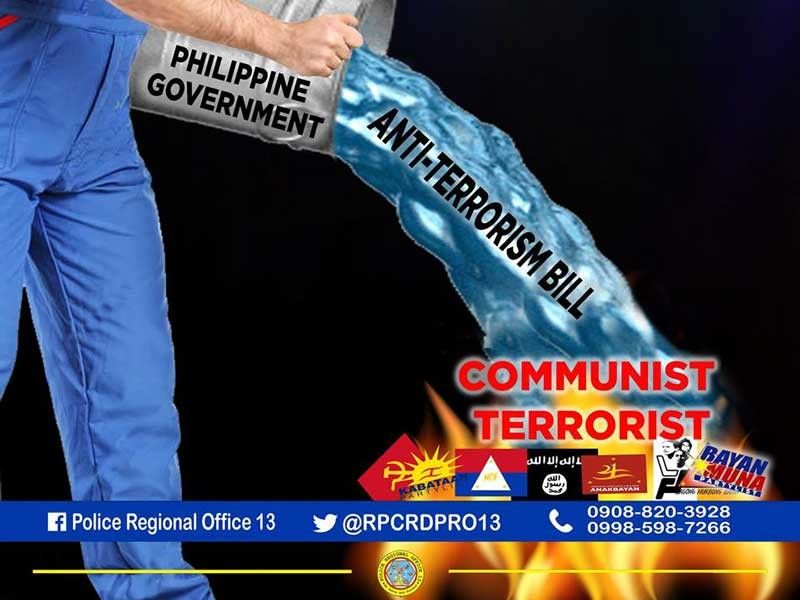Law enforcers caught red-tagging under anti-terror bill won't be tolerated — DILG

MANILA, Philippines — Should the Anti-Terror Bill be passed into law, the Department of the Interior and Local Government will not tolerate red-tagging and other forms of human rights violations invoking the said law, it said Wednesday.
Speaking to the media at Wednesday morning's Kapihan Sa Manila Bay online forum, Interior Secretary Eduardo Año, a former military general, said that the proposed law had enough safeguards against potential abuse, despite current violations already having occurred.
"If any abuses come out, it says there in the law anyway that they get 10 years imprisonment. That's anyone who arrests without adhering to the rules of court or conducts wiretapping without authorization or court order, or any torture or violations of human rights. That's 10 years imprisonment and banning from government positions," he said in a mix of Filipino and English.
“As long as they are not committing any crime or inciting to sedition or rebellion, they can actually express their grievances through peaceful means of course. So we will not tolerate or allow this,” Año added.
As it stands, though, elements of the national police have already actively and publicly red-tagged activists and solons found to be critical of the administration.
READ: Dura 'Likes': PNP social media rules and what police actually post | PNP 'art' tags activists as terrorists amid debate on anti-terrorism bill
Various regional offices of the national police posted images on their official social media channels accusing legal activist organizations of being communist fronts Sunday night, implying that the bill pending President Rodrigo Duterte's signature would "put them out" and effectively violating their own social media protocols.
Though Police Gen. Archie Gamboa, PNP chief, has spoken out about these and reminded cops that violations of social media rules could yield charges, the posts continue.
Students who were arrested in Iligan City also reported that they were red-tagged, harassed and called liars throughout their eight hours in detention.
'Internalized adherence to human rights'
The PNP is a bureau of the DILG, though the interior department itself has expressed this position as well.
In a forum in early March, the department assured the public that the law had enough safeguards against abuse. In the same breath, though, it also conflated legal activist groups with communist rebels, saying they ultimately have the same goals.
RELATED: DILG vows no abuse of anti-terror law; insists rallyists and rebels have 'same intent'
Asked how the department aims to address reported cases of violations at the hands of policemen, Año said: "We've done a lot of dismissals and suspensions on policemen who have been found to violate human rights. When I was [National Police Commission] chief, we removed almost 3,000 cops."
"Let's not compare what happened in the past to now. We can see that they internalized within the organization the adherence to human rights," he added.
The anti-terrorism bill now only needs Duterte's signature before it becomes a law.
While Malacanang said the president is inclined to sign into law the controversial bill, Justice Secretary Menardo Guevarra earlier said he is confident that Duterte will wait for his agency's input before acting on the proposed measure.
The DOJ is set to submit its review on the constitutionality of the anti-terrorism bill by Wednesday. Duterte has three options: sign the bill into law, not act on it for 30 days and lapse into law or veto it. — with report from Kristine Joy Patag
President Rodrigo Duterte signed the Anti-Terrorism Law on July 3 despite opposition from rights groups and civil society groups that it could be used to stifle human rights.
A petition against the law has been filed at the Supreme Court and other groups are preparing pleadings of their own.
Follow this page for updates. Photo courtesy of The STAR/Michael Varcas
National Security Adviser Hermogenes Esperon moves to block access to several websites, including news sites of alternative news orrganizations Bulatlat.com and Pinoyweekly.org.
In his letter to the National Telecommunications Commission, he only says the websites are "affiliated to and are supporting these terrorists and terrorist organizations."
No other basis to back up his allegation was cited in the letter.
Citing the designation of the CPP-NPA-NDF as terrorists, NSA Hermogenes Esperon moves to block access to several sites.
— Kristine Patag (@kristinepatag) June 22, 2022
In Esperon's letter to the NTC, he included news sites @bulatlat and @pinoyweekly; sites of other progressive groups RMP and Save our Schools. @PhilstarNews pic.twitter.com/nAzMITJFsS
The Commission on Human Rights says it "partly welcomes" the Supreme Court decision that some parts of the controversial Anti-terrorism Law are unconstitutional.
CHR spokesperson Jacqueline de Guia says the commission remains hopeful that the remaining contentious provisions of the law will be clarified by the high cour in the full text of the decision.
"At the same time, our commitment remains in guarding against possible human rights violations arising from the implementation of the anti-terror law. We steadfastly remind the government that countering terrorism and protecting human rights are not competing values but are, in fact, mutual and complementary," De Guia says in a statement.
The Supreme Court has deliberated and voted on the controversial Anti-Terrorism Act but the decision will be released "at the soonest time possible."
"However, considering that there were numerous issues resolved in the case, as well as the fact that each Justice had to vote on each issue, there is a need to accurately confirm and tally the vote of each Justice in order to ensure the correct resolution of the Court per issue," SC spokesperson Brian Hosaka says.
The Anti-Terrorism Council designates the National Democratic Front of the Philippines, the panel that negotiates for communist rebels during peace talks a terrorist organization.
Previous designation of the Communist Party of the Philippines and New People's Army led to the designation of supposed members of the CPP's Central Committee. Among those designated as terorrists were peace consultants.
Designation gives the Anti-Terrorism Council the authority to investigate and freeze the accounts of designated persons.
The Anti-Terrorism Council has designated 29 people, including alleged members of the Communist Party of the Philippines-New People's Army, as terrorists in two resolutions.
Designation allows the Anti-Money Laundering Council to freeze the assets of those on the list.
- Latest
- Trending



































